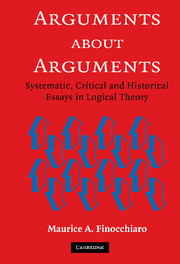Book contents
- Frontmatter
- Contents
- Preface and Acknowledgments
- Introduction : An Approach to a Branch of Logic
- Theorizing about reasoning and argument
- 1 Informal Logic and the Theory of Reasoning (1984)
- 2 An Historical Approach to the Study of Argumentation (1987)
- 3 Methodological Problems in Empirical Logic (1989)
- 4 Two Empirical Approaches to the Study of Reasoning (1994)
- 5 Critical Thinking, Critical Reasoning, and Methodological Reflection (1996)
- Fallacies and asymmetries
- Critiques
- Historical analyses
- Selected Bibliography
- Index
5 - Critical Thinking, Critical Reasoning, and Methodological Reflection (1996)
from Theorizing about reasoning and argument
Published online by Cambridge University Press: 05 February 2015
- Frontmatter
- Contents
- Preface and Acknowledgments
- Introduction : An Approach to a Branch of Logic
- Theorizing about reasoning and argument
- 1 Informal Logic and the Theory of Reasoning (1984)
- 2 An Historical Approach to the Study of Argumentation (1987)
- 3 Methodological Problems in Empirical Logic (1989)
- 4 Two Empirical Approaches to the Study of Reasoning (1994)
- 5 Critical Thinking, Critical Reasoning, and Methodological Reflection (1996)
- Fallacies and asymmetries
- Critiques
- Historical analyses
- Selected Bibliography
- Index
Summary
Argument Analysis
I want to begin this chapter with a relatively uncontroversial assumption. That is, I regard it as unproblematic that one type of critical thinking is the reasoned interpretation or evaluation of an argument. Note, however, that this really involves two special cases of critical thinking, the reasoned interpretation of arguments and the reasoned evaluation of arguments; for I distinguish interpretation and evaluation along obvious lines that I could elaborate but shall not, for lack of space; on the other hand, if we want a single handy label to refer to one or the other or both, we may speak of the critical interpretation of arguments, or argument analysis. Similarly, note that I speak of the reasoned interpretation or evaluation and not of mere interpretation or evaluation; that is, in these two special cases of critical thinking we must have not only an interpretive or evaluative claim about an argument, but also a justification of the claim by means of reasons. In other words, this first, presumably uncontroversial type of critical thinking is the case of what may be called reasoning about reasoning, or argumentation about argumentation.
Informal Logic
This first, prototypical case of critical thinking needs now to be limited in one direction, and broadened in two others. The limitation involves the problem of the relationship between critical thinking and informal logic. For the latter too aims at the interpretation and evaluation of arguments. What then is the difference?
Information
- Type
- Chapter
- Information
- Arguments about ArgumentsSystematic, Critical, and Historical Essays In Logical Theory, pp. 92 - 106Publisher: Cambridge University PressPrint publication year: 2005
